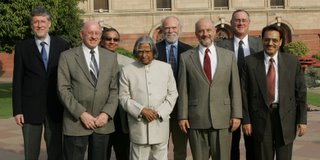And more...
Chinmay replies, "Personally, if ego was my primary driving force, I'd try and pick an occupation where I was in charge of a large amount of resources (money, hopefully ;) and 'controlled' a lot of people's future; rather than fiddle with chemicals and machines and data all day."
That is the point then. It all depends on what feeds your ego. Mine isnt fed by controlling resources (or people...thats too easy)... It is by being the first one to figure out something (a secret of nature) or by gaining knowledge that was unknown to humanity before. Hence the motivation.
Of course one can always argue that all jobs require one's ego then, as a lot of people take pride in doing their jobs well. But being scientists is among the very few professions where you can take pride in doing your job well, and also be the ONLY one who can do that job well (your job is shared by only thousands instead of millions....)
And yet I agree, ego cannot be the sole motivation because then you would run out pretty fast.
( The first rule of war,
is figuring what you're fighting for.
If what's at stake is only pride,
I'd pick peace and step aside. )






